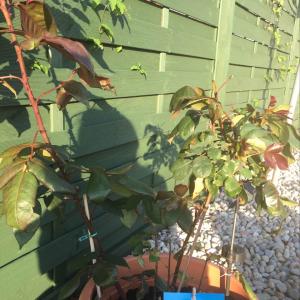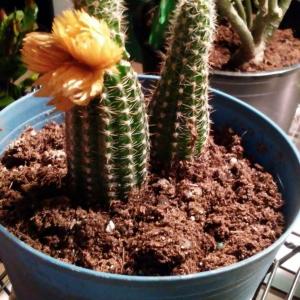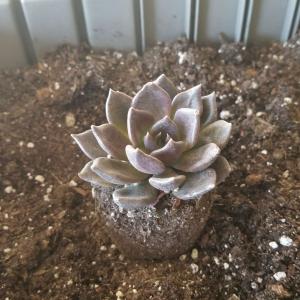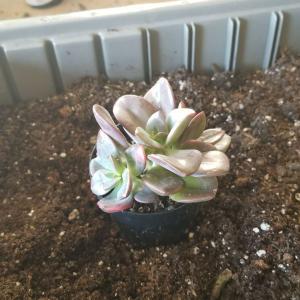成长记
Myah Lerch
2017年06月03日

I new added a "Pachyveria glauca hybrid "Blue Quartz"" in my "garden"


2
0
成长记
Frajille
2017年05月24日

I new added a "TORCH CACTUS "Trichocereus grandiflorus hybrid"" in my "garden"


1
0
成长记
doctronix702
2017年05月22日
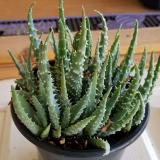
I new added a "Perle.Von Nurnberg (Echeveria Hybrid)" in my "garden"


2
0
文章
Mirella
2017年05月22日

Learn how to grow cauliflower in containers in this article. Growing cauliflowers in containers is not very difficult if you know its proper requirements and ideal growing conditions.

However, cauliflower is a cool season crop but there are many hybrid cultivars available for both temperate and tropical weather, which means it can be grown diversely in a variety of climates.
How to Grow Cauliflower in ContainersPlanting cauliflower in containers
It is important to plant the variety that fits the season and climate you are living in. Cauliflowers can be planted anytime in frost free climate when the temperature is in the range of 50-85 F (10 C to 30 C). At the time when heads are maturing, the ideal temperature is around 60-70 F (15-20 C).
Generally, in warmer regions (USDA Zone 9 – 11), you can start to sow cauliflower seeds in fall and continue to sow the seeds until the end of winter. In cooler zones, it is better to sow the seeds until late winter and up to spring to get summer or fall harvest.
Propagation
Sowing, transplanting, and planting is same as for the cabbages. Sow the seeds in a seed starting mix, 1 or 2 cm deep and 4 cm apart. Once the seedlings germinated and plants have 3 or 4 leaves, you can start growing cauliflower in containers.
Choosing a Container
Choose a pot that is 12 inches deep and at least 10 inches wide to allow enough room for a plant to grow. Also, make sure it has enough drainage holes in the bottom. In such a pot you can grow one plant.
You can also grow 2-3 cauliflower plants together in large buckets, half whiskey barrels and even in sacks.
Requirements for Growing Cauliflower in Containers
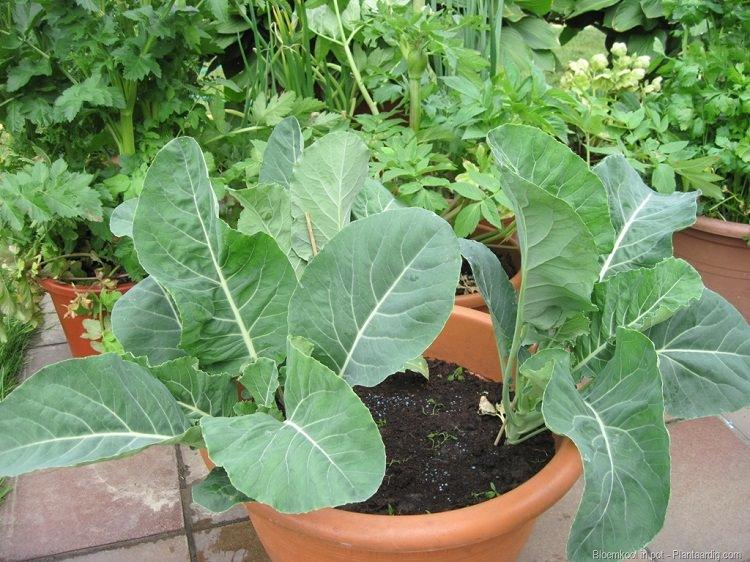
Position
Prefer to keep the pot in a sunny spot that receives at least 6 hours of sun. In tropics, grow the plant in a partial sun.
Soil
Like all brassicas, cauliflowers are quite demanding on the soil. Fill the pot with a quality potting soil that is light, deep, humus-rich and slightly clayey. As cauliflower grows best in moist soil choose the substrate that holds some moisture but also drains well.
Watering
Because growing cauliflower requires moist soil, you’ll need to water it regularly. It is important to prevent the drying of the soil in the period when the seedling is maturing and at the time of head formation. Drought-like conditions lead to the formation of smaller or separate heads or even to a complete loss of them. Overwatering also impede its growth, which must be avoided.
Cauliflower Plant Care
When the head or flower (curd) of cauliflower becomes 2-3 inches in diameter (this is unnecessary for colored varieties), cover it with the inner leaves by breaking or tying them over the head. It is called blanching. This will protect the head from the sun and you’ll get healthy white colored and more flavorsome cauliflower after harvest.
Fertilizer
Cauliflower plant is a heavy feeder. You can mix compost or well-rotted manure into the soil at the time of planting. Besides this, fertilize it with 10-10-10 water soluble fertilizer monthly.
Mulching
Mulching can be skipped when you’re growing cauliflower in containers. But you can do it to keep the soil cool and preserve moisture in the soil. In winter, mulching will keep the soil warm and insulate the roots from cold.
Pests and Diseases
Pests that damage the leaves, such as flea beetles, the larva of cabbage butterfly and moths love to feed on this plant. It can also be attacked by aphids and white flies.
In diseases, it is infected by clubroot, which can be checked if quality soil is used. It also gets affected by powdery mildew. To prevent it, avoid wetting the foliage.
Harvesting
The harvesting of cauliflower takes place virtually throughout the year, depending on the variety and sowing period. Generally, harvesting takes place about 3-4 months after planting.
You can check if cauliflower is ready for harvest when the head (curd) is fully developed (6 to 12 inches in diameter, depending on the variety) and still compact. Once the blanching is done you can harvest the cauliflower in 7-12 days.
Things to RememberCauliflower heads (flowers) become ready for harvest in 3-5 months.Cauliflower requires moderate temperature, around 60 – 75 F is ideal.Too high or too cold temperature leads to premature heading.Cauliflower requires constant nutrient supply and slightly moist soil with ideal pH around 6.5-6.8.Right watering is the key to growing cauliflowers. For the best result, water carefully. Both underwatering or overwatering must be avoided.

However, cauliflower is a cool season crop but there are many hybrid cultivars available for both temperate and tropical weather, which means it can be grown diversely in a variety of climates.
How to Grow Cauliflower in ContainersPlanting cauliflower in containers
It is important to plant the variety that fits the season and climate you are living in. Cauliflowers can be planted anytime in frost free climate when the temperature is in the range of 50-85 F (10 C to 30 C). At the time when heads are maturing, the ideal temperature is around 60-70 F (15-20 C).
Generally, in warmer regions (USDA Zone 9 – 11), you can start to sow cauliflower seeds in fall and continue to sow the seeds until the end of winter. In cooler zones, it is better to sow the seeds until late winter and up to spring to get summer or fall harvest.
Propagation
Sowing, transplanting, and planting is same as for the cabbages. Sow the seeds in a seed starting mix, 1 or 2 cm deep and 4 cm apart. Once the seedlings germinated and plants have 3 or 4 leaves, you can start growing cauliflower in containers.
Choosing a Container
Choose a pot that is 12 inches deep and at least 10 inches wide to allow enough room for a plant to grow. Also, make sure it has enough drainage holes in the bottom. In such a pot you can grow one plant.
You can also grow 2-3 cauliflower plants together in large buckets, half whiskey barrels and even in sacks.
Requirements for Growing Cauliflower in Containers

Position
Prefer to keep the pot in a sunny spot that receives at least 6 hours of sun. In tropics, grow the plant in a partial sun.
Soil
Like all brassicas, cauliflowers are quite demanding on the soil. Fill the pot with a quality potting soil that is light, deep, humus-rich and slightly clayey. As cauliflower grows best in moist soil choose the substrate that holds some moisture but also drains well.
Watering
Because growing cauliflower requires moist soil, you’ll need to water it regularly. It is important to prevent the drying of the soil in the period when the seedling is maturing and at the time of head formation. Drought-like conditions lead to the formation of smaller or separate heads or even to a complete loss of them. Overwatering also impede its growth, which must be avoided.
Cauliflower Plant Care
When the head or flower (curd) of cauliflower becomes 2-3 inches in diameter (this is unnecessary for colored varieties), cover it with the inner leaves by breaking or tying them over the head. It is called blanching. This will protect the head from the sun and you’ll get healthy white colored and more flavorsome cauliflower after harvest.
Fertilizer
Cauliflower plant is a heavy feeder. You can mix compost or well-rotted manure into the soil at the time of planting. Besides this, fertilize it with 10-10-10 water soluble fertilizer monthly.
Mulching
Mulching can be skipped when you’re growing cauliflower in containers. But you can do it to keep the soil cool and preserve moisture in the soil. In winter, mulching will keep the soil warm and insulate the roots from cold.
Pests and Diseases
Pests that damage the leaves, such as flea beetles, the larva of cabbage butterfly and moths love to feed on this plant. It can also be attacked by aphids and white flies.
In diseases, it is infected by clubroot, which can be checked if quality soil is used. It also gets affected by powdery mildew. To prevent it, avoid wetting the foliage.
Harvesting
The harvesting of cauliflower takes place virtually throughout the year, depending on the variety and sowing period. Generally, harvesting takes place about 3-4 months after planting.
You can check if cauliflower is ready for harvest when the head (curd) is fully developed (6 to 12 inches in diameter, depending on the variety) and still compact. Once the blanching is done you can harvest the cauliflower in 7-12 days.
Things to RememberCauliflower heads (flowers) become ready for harvest in 3-5 months.Cauliflower requires moderate temperature, around 60 – 75 F is ideal.Too high or too cold temperature leads to premature heading.Cauliflower requires constant nutrient supply and slightly moist soil with ideal pH around 6.5-6.8.Right watering is the key to growing cauliflowers. For the best result, water carefully. Both underwatering or overwatering must be avoided.
1
0



